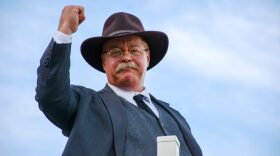On June 25, 1918, 20-year-old Quentin Roosevelt wrote to his mother from his station in France, saying: “I am now a member of the 95th Aero Squadron. I’m on the front! Cheers, oh cheers, and am very happy.” He had dropped his Harvard studies to become a fighter pilot in the Great War, in the US expeditionary force in France, where his three older brothers also served.
The Roosevelt family recognized that the beloved youngest son was a fascinating scamp and the apple of his father’s eye.
He also proved himself with his comrades. Early on he downed an enemy aircraft in battle. His captain, the famous American ace Eddie Rickenbacker said: “Quentin was one of the most popular fellows in the group – hearty and absolutely square in everything he said or did. We loved him purely for his own natural self.”
On July 14th, 1918, Quentin went down behind enemy lines during an aerial battle with three German aircraft over the fields of France. The Germans buried him there, and were taken aback to learn they had killed a former president’s son.
The Roosevelt’s became Gold Star parents.
Quentin’s death altered his stricken father’s very being, and may have hastened TR’s passing a mere six months later. Writing about his wife, TR wrote:
“Quentin was her baby, the last child to leave the home nest. On the night before he left, she did what she had always done and went upstairs to tuck him into bed, the huge, laughing, gentle-hearted boy. He was engaged to a beautiful girl of high character and it is heartbreaking for her as well as his mother, but they have both said they would rather have him never come back than never to have gone. He had his crowded hour, he died at the crest of life, in the glory of the dawn. All of us who give service, and stand ready for sacrifice are the torchbearers. We run with the torches until we fall.”
Dakota Datebook: Remembering Theodore Roosevelt is written and performed by Steve Stark. Funding provided by the Theodore Roosevelt Medora Foundation.




